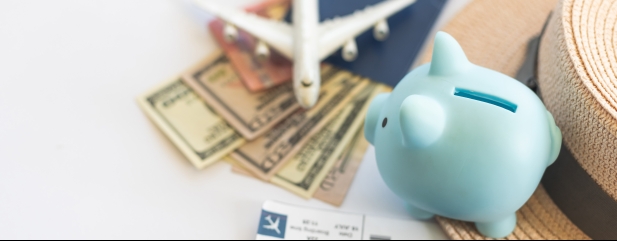Archived article
Please note that tax, investment, pension and ISA rules can change and the information and any views contained in this article may now be inaccurate.
Five holiday money pitfalls to avoid

The summer holidays are fast approaching, and for millions of people, that will mean buying some euros, krona or lira and jetting off for a couple of weeks of sunshine. In the flurry of pre-departure activity, it’s easy to lose sight of getting hold of some travel money, and that can often leave you rushing to convert your pounds at the last minute, probably getting a poor deal into the bargain.
The puzzling array of currency rates and conversion charges levied doesn’t help. Despite being a simple transaction conducted annually by millions of people, getting the best deal is surprisingly difficult. But there are some obvious pitfalls to avoid which can set you on the right track.
HITTING THE BUREAU DE CHANGE AT THE AIRPORT
Probably the biggest faux pas you can make when buying foreign currency is to do so at the airport bureau de change, where currency rates are normally really poor. Somewhat bizarrely, if you order online in advance to pick up from the same kiosk, you’ll get a much better rate. The same principle applies to getting travel money from the Post Office, which is another popular choice. Individual outlets will usually have their own currency rates but if you order online beforehand, you’ll be quids in. At my local branch I could convert £1 into €1.11, but if I ordered online for collection at the same branch I could get €1.14. On £1,000 exchanged, that’s an extra €30 to spend on holiday, just by planning ahead a bit.
PAYING FOR YOUR ONLINE MONEY WITH A CREDIT CARD
You still need to be careful when ordering travel money online too. That’s because if you pay by credit card, you’re likely to pay a substantial ‘cash fee’ to your bank. We’re all probably used to this if withdrawing money from an ATM using a credit card, which is why no-one does it. But banks also often charge the same fee for ‘cash-like’ transactions, including buying holiday money.
It’s extremely cheeky, because your bank isn’t actually converting your money into cash in this instance, the currency exchange provider is. However, it’s clearly best to avoid these charges by sticking to using a debit card when ordering holiday cash online.
USING YOUR STANDARD BANK CARDS ABROAD
Another common pitfall to watch out for is using your standard debit or credit card while on holiday. Standard debit and credit cards often levy ‘non-sterling transaction fees’ on transactions in foreign currencies, normally in the region of 2.5% to 3% of the purchase amount. Some current accounts won’t charge this fee, but they will usually come with monthly charges or minimum monthly deposits. If you already qualify for such accounts then you might avoid the fee, but you’ll still be subject to the bank’s currency conversion rate. The exchange rate you get from high street current accounts usually isn’t bad, but neither is it the best.
If you regularly need holiday money, it might be worth considering getting a pre-paid card from the likes of Wise or Revolut, or setting up a bank account with low or no currency transaction fees, such as those from Monzo or Starling. These more specialist accounts are easy to manage via mobile app and usually have very good exchange rates as well as low, or in some cases, no fees.
Some cards apply restrictions to how much you can use them so it’s worth doing your homework to find the one that suits you best. But once you’ve done this, you can then enjoy low currency fees and competitive rates on holiday every time you pay by card.
PAYING IN STERLING ON A CARD TERMINAL
That is, unless you fall into our fourth pitfall. When you pay using your card overseas, you will normally be asked if you want to pay in the local currency or sterling. It’s massively tempting to hit sterling, but that could be a big mistake. By hitting ‘sterling’ on the card terminal, or the ATM if you’re withdrawing cash, you’re essentially handing over the conversion process to the provider behind the ATM or card terminal.
That will probably mean you get a poor exchange rate. By hitting the local currency option, for instance ‘euros’ in Spain, the currency conversion is executed by your own card provider, and if you’ve sniffed out a competitive account for overseas transactions, then it will almost certainly mean you get a better exchange rate.
BUYBACK OPTIONS
The final travel money pitfall to avoid is when you get back from holiday. If you have unused foreign currency notes, you might be tempted to change them back into sterling. Unfortunately, unless you have thought ahead, the rate you get probably won’t be pretty.
For example, the exchange rate provider eurochange will sell you €114.56 euros for £100, but if you bring all those euros back and exchange them again, you’ll only get £90.07 in return. That’s quite a hit.
Some travel money providers will offer you a buyback promise which guarantees they will buy currency back at the same rate they sold it to you. However, there will be a charge associated with this service and often limits on how much you can exchange. As an indication, Travelex charge £4.99 for their buyback promise, and will only buy back up to £250 of foreign currency. If you don’t return with any foreign currency, or only a little, that fixed charge does very little for you. It might be a better to buy some gifts at the airport or simply stash the money away for your next holiday.
Note: All exchange rates quoted as of 24th June 2025.
Important information:
These articles are provided by Shares magazine which is published by AJ Bell Media, a part of AJ Bell. Shares is not written by AJ Bell.
Shares is provided for your general information and use and is not a personal recommendation to invest. It is not intended to be relied upon by you in making or not making any investment decisions. The investments referred to in these articles will not be suitable for all investors. If in doubt please seek appropriate independent financial advice.
Investors acting on the information in these articles do so at their own risk and AJ Bell Media and its staff do not accept liability for losses suffered by investors as a result of their investment decisions.
 magazine
magazine








